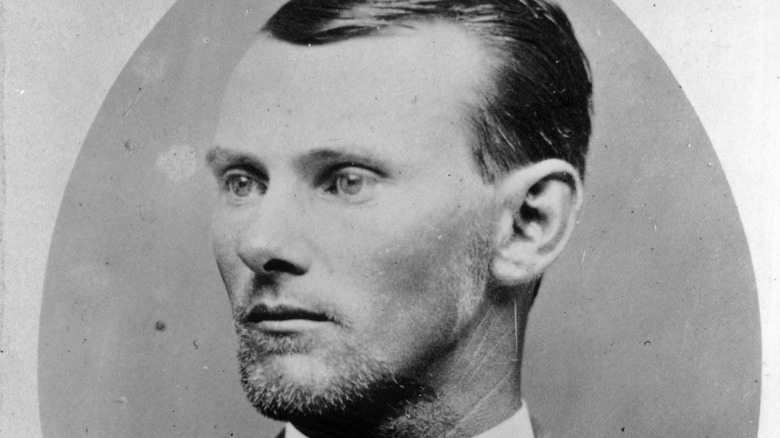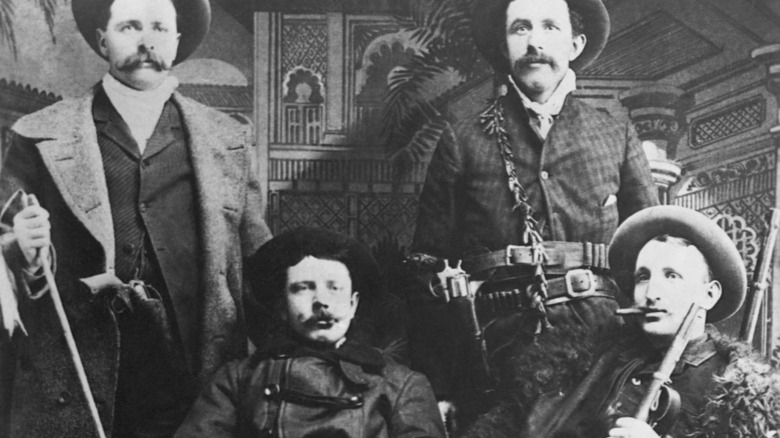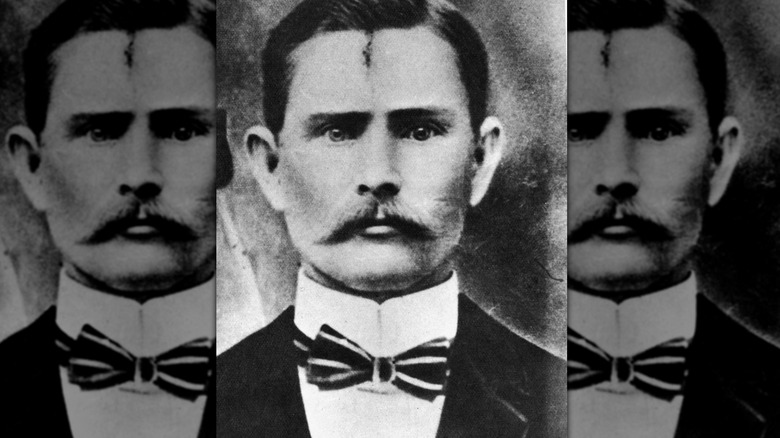The Myth So Many People Believed About Jesse James
The myth of America's Wild West is that of an open, lawless frontier giving way to civilization through the clash of archetypal characters — lawmen, outlaws, and savages. That this is a massive oversimplification hasn't stopped the legend of the Wild West from infusing itself into American culture, sometimes to the point of domination. Books, films, and video games with notoriously high body counts still ensconce themselves in the West's ambiance, and readers and audiences still turn out for dramatizations of notorious figures like Wyatt Earp and Jesse James.
James was a legend even in his time. From his first robbery on December 7, 1869 (per PBS), he attracted attention, and unlike many thieves and criminals, he relished the spotlight. The son of slaveholders, embittered both by the Confederacy's defeat and that he'd been too young to fight for it, James entered the Reconstruction era with a chip on his shoulder. He had connections with ex-Confederates in the media who helped shape and sell his legend. In the hands of newspaper editors like John Newman Edwards, James became an American Robin Hood, champion of Southerners held down by the Radical Republicans who led Reconstruction. James even wrote letters that were published in the press in which he proudly called himself a "bold robber" in the tradition of Alexander the Great.
It was a deliberate public relations campaign, one that's still shaping perceptions of James and his gang. It was also built almost entirely on lies. James's first robbery was a bust that saw an unarmed man killed, and his outlaw career was that of a violent murderer who never shared his plunder with the poor.
Jesse James was violent and hoarded his plunder
Warning signs for Jesse James's violent streak showed themselves early in his life. Though he was too young to join his brother Frank in the Confederate army, he eagerly joined up with a guerilla campaign in 1864 at the age of 16 (per PBS), a group implicated in wanton slaughter of unarmed Union soldiers. The man James killed during his first robbery died because James mistook him for the former Union officer who'd killed James's guerilla leader. Resentment and violence against Northerners and Republicans were foundational to the James gang's activities.
The rough edges of James's robberies were sanded off or otherwise obscured by the heroic veneer James and his supporters in the Southern press put on his activities. James went so far as to write editorials protesting his innocence of particular crimes. The Robin Hood image he cultivated helped in burnishing his reputation. But far from robbing the wealthy to help the less fortunate, James hurt them as much as anyone. As Professor Cathy Jackson told the Journalism History podcast: "[Jesse James] kept all his money. He didn't give anything to the poor. He didn't care about them. Their money was in the bank, so he was robbing them, too. Why would he give it back to them?"
Besides pilfering the banks that held everyone's money, James sometimes directly targeted the common man. He and his gang terrorized a church congregation in Iowa after a bank robbery for no other reason than James's wounded vanity at being "upstaged" by a political speech at the church.
The Jesse James legend was sold to people back east
The ego of Jesse James himself should not be discounted when examining how his myth as a Wild West Robin Hood developed. James thrived on the attention paid him by sympathetic journalists. Besides writing to newspapers, he sometimes left behind his own press releases when he committed a robbery. When he and his gang shifted their targets from banks to trains, he usually spared the passengers, lest robbing them hurt his reputation. As for the Southern editors and writers who polished James's image, many of them were embittered former Confederates like James with a stake in the persecution complex he embodied, particularly in his home state of Missouri.
But there was also a healthy market for stories of outlaws like James back east. Then as now, people flocked to a good story, particularly one featuring a charismatic and colorful central figure. People also love the novel and exotic, and for Americans living on the East Coast, the Wild West was just such a place, full of violence and romance. Throw in the lingering tensions from the Civil War that animated James, and he made for an ideal character to captivate such an audience. The stories written in Missouri, once carried back east, found a whole new life that kept the James legend alive after his death.


